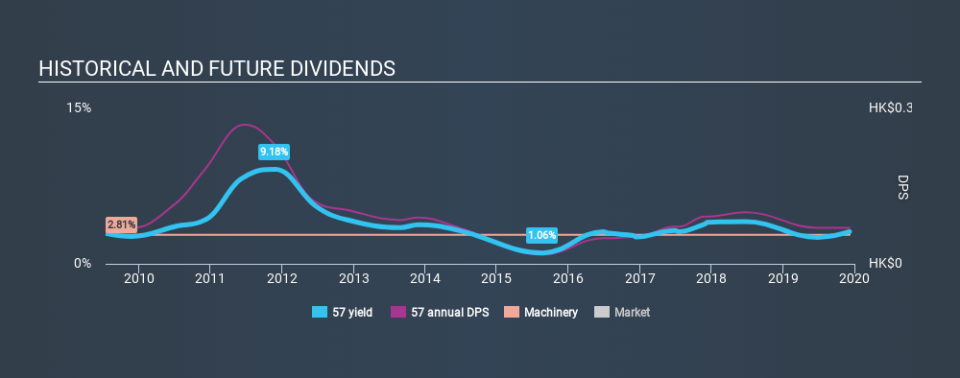Chen Hsong Holdings Limited (HKG:57) Is About To Go Ex-Dividend, And It Pays A 3.1% Yield

Chen Hsong Holdings Limited (HKG:57) stock is about to trade ex-dividend in 3 days time. Ex-dividend means that investors that purchase the stock on or after the 12th of December will not receive this dividend, which will be paid on the 14th of January.
Chen Hsong Holdings's next dividend payment will be HK$0.035 per share, on the back of last year when the company paid a total of HK$0.07 to shareholders. Calculating the last year's worth of payments shows that Chen Hsong Holdings has a trailing yield of 3.1% on the current share price of HK$2.24. Dividends are an important source of income to many shareholders, but the health of the business is crucial to maintaining those dividends. That's why we should always check whether the dividend payments appear sustainable, and if the company is growing.
View our latest analysis for Chen Hsong Holdings
Dividends are typically paid from company earnings. If a company pays more in dividends than it earned in profit, then the dividend could be unsustainable. Chen Hsong Holdings paid out a comfortable 45% of its profit last year. That said, even highly profitable companies sometimes might not generate enough cash to pay the dividend, which is why we should always check if the dividend is covered by cash flow. It paid out 92% of its free cash flow in the form of dividends last year, which is outside the comfort zone for most businesses. Cash flows are usually much more volatile than earnings, so this could be a temporary effect - but we'd generally want look more closely here.
While Chen Hsong Holdings's dividends were covered by the company's reported profits, cash is somewhat more important, so it's not great to see that the company didn't generate enough cash to pay its dividend. Were this to happen repeatedly, this would be a risk to Chen Hsong Holdings's ability to maintain its dividend.
Click here to see how much of its profit Chen Hsong Holdings paid out over the last 12 months.
Have Earnings And Dividends Been Growing?
Stocks in companies that generate sustainable earnings growth often make the best dividend prospects, as it is easier to lift the dividend when earnings are rising. If earnings decline and the company is forced to cut its dividend, investors could watch the value of their investment go up in smoke. This is why it's a relief to see Chen Hsong Holdings earnings per share are up 5.1% per annum over the last five years. Earnings have been growing at a steady rate, but we're concerned dividend payments consumed most of the company's cash flow over the past year.
Many investors will assess a company's dividend performance by evaluating how much the dividend payments have changed over time. Chen Hsong Holdings's dividend payments are broadly unchanged compared to where they were ten years ago.
The Bottom Line
Is Chen Hsong Holdings worth buying for its dividend? Chen Hsong Holdings delivered reasonable earnings per share growth in recent times, and paid out less than half its profits and 92% of its cash flow over the last year, which is a mediocre outcome. In summary, it's hard to get excited about Chen Hsong Holdings from a dividend perspective.
Curious about whether Chen Hsong Holdings has been able to consistently generate growth? Here's a chart of its historical revenue and earnings growth.
If you're in the market for dividend stocks, we recommend checking our list of top dividend stocks with a greater than 2% yield and an upcoming dividend.
If you spot an error that warrants correction, please contact the editor at editorial-team@simplywallst.com. This article by Simply Wall St is general in nature. It does not constitute a recommendation to buy or sell any stock, and does not take account of your objectives, or your financial situation. Simply Wall St has no position in the stocks mentioned.
We aim to bring you long-term focused research analysis driven by fundamental data. Note that our analysis may not factor in the latest price-sensitive company announcements or qualitative material. Thank you for reading.


